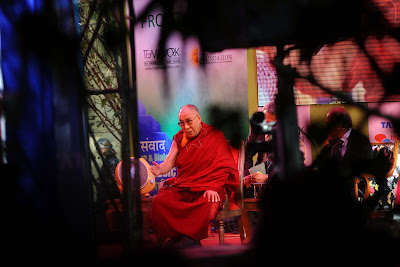The first day of DSC Jaipur Literature Festival 2013 saw a global icon of peace convey his message to thousands of festival attendees. The Nobel Peace Prize Laureate, His Holiness the 14th Dalai Lama, spoke about his understanding of the way of seeing and knowing taught by the Buddha in conversation with author Pico Iyer. This marks the beginning of a special strand of sessions, titled ‘The Buddha in Literature’, at the Festival this year.
 |
| Dalai Lama at Jaipur Literature Festival 2013 in conversation with author Pico Iyer |
The Dalai Lama talked about global politics, although he conceded that he is now retired from his political role. He urged for there to be “good relations” between China and India, as they were the “most populous nations in the world”, and that China could learn from India. He said that these two countries needed to develop trust in each other and from that, equality and democracy could flourish without fear.
The Dalai Lama talked about the challenges of the 21st century, with population increases, and the widening gap between the rich and the poor. He warned about greed, joking that “even if the whole world own, then maybe want to buy some land on moon and set up a hotel there”. He warned that corruption had become “the cancer of the whole world - very serious”, and called for a more sustainable economy, more protection for women, and to “forcibly reduce this gap between the rich and the poor”. He called the 20th century “a century of bloodshed, of violence” and urged that the “21st century be a century of dialogue”.
This depends on education, he emphasised. He called for an update of the existing education system, saying “there is something lacking about it”, and that moral ethics should be taught from a secular base, since ethics are not dependent on religion. He emphasized the need to train the mind so that inner values and qualities could flourish, as “the mind knows no limitations” and we need to learn to use our intelligence “more holistically”.





No comments:
Post a Comment